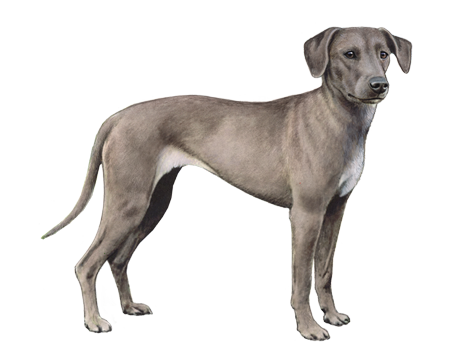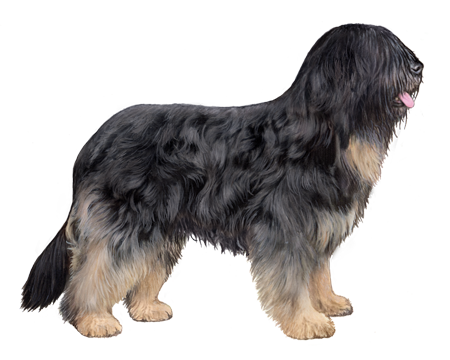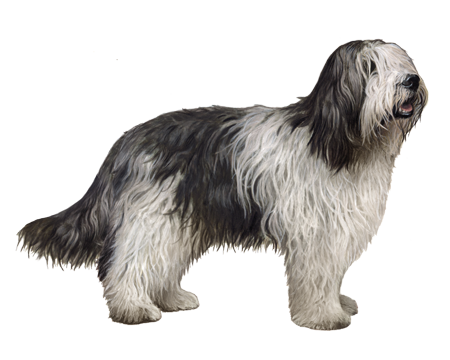
Saarloos Wolfdog
The Saarloos Wolfdog is a proud, lively breed with an independent nature. These reliable, wolf-like dogs are affectionate with their people and make good watchdogs.
Interested in discovering if your dog is a Saarloos Wolfdog?
Check out Wisdom Panel's DNA tests.

Saarloos Wolfdog Traits
General Appearance
There's no mistaking this breed's ancestry when you first see their wolfish good looks. The Saarloos Wolfdog has a strong and balanced appearance, with well-pronounced differences between males and females.
Coat and Colouring
The breed has a thick, double coat with harsh, straight hairs and a soft undercoat. In the winter, the undercoat is the most noticeable. And in the summer, the topcoat predominates.
The most common coloring is classic "wolf grey." However, "wolf brown" (light to dark shaded brown) and white are other possible colors. In "wolf grey" and "wolf brown" dogs, pale creamy white or white markings appear on the body's underside, the inner side of the legs, the breeches, and under the tail.
Distinctive Physical Traits
Saarloos Wolfdogs have the long front legs and the powerful hind legs of a German Shepherd. Their ears are upright or "prick," and their eyes are yellow and almond-shaped. They have full, bushy tails that hang low—often between their legs.
Saarloos Wolfdog Temperament
Though lively and independent, Saarloos Wolfdogs are typically reserved around strangers. They may seem aloof, which isn't surprising considering the breed so recently descended from wolves.
That said, these dogs are very devoted to their people and form tight bonds with them. They're protective of family and make good watchdogs. For the same reason, they may need help socializing and living among a full household or other animals.


Saarloos Wolfdog History
In the early 1930s, Leendert Saarloos began breeding German Shepherd Dogs with wolves in the Netherlands. He sought to create a hardy, self-reliant companion dog that possessed some of the fundamental behavioral characteristics he felt German Shepherd Dogs had lost. The result was the Saarloos Wolfdog.
Though not intended as a working dog, the Saarloos Wolfdog initially showed promise as a guide for the blind. But over time, it became clear the breed wasn't suited for such work. And Saarloos' experiment ultimately backfired when the Wolfdog exhibited the contradictory attributes of caution, reservation, and lack of ferocity.
The United Kennel Club recognized the Saarloos Wolfdog in 2006.
Saarloos Wolfdog Care
Nutrition
Saarloos Wolfdogs need high-quality food appropriate for their life stage (e.g., puppy, adult, senior). They also benefit from diets formulated for large breeds—particularly when they're puppies. Feeding a large-breed puppy diet helps prevent Saarloos Wolfdogs from growing too fast and developing skeletal problems.
Since all dogs are at risk for obesity if they overeat, it's crucial to monitor your pup's food intake. And don't forget to account for treats—they should make up no more than 10% of your dog's calories.
Grooming
Saarloos Wolfdogs have thick double coats and shed year-round. So, be sure to brush your dog a couple of times a week to remove loose hair. When shedding is heaviest (during summer and fall), this breed may need more frequent brushing—up to several times a week.
It's also wise to keep your Saarloos Wolfdog's nails trimmed and ears clean to prevent infections. Regular dental care—including at-home teeth brushing and professional cleanings—should also be part of every dog's grooming routine, regardless of breed.
Exercise
This active breed needs lots of mental and physical exercise. Daily long walks or runs allow them to burn energy—and, in turn, prevent unwanted behaviors, such as barking. Saarloos Wolfdogs like to roam, but its best to keep them in an enclosed area to keep them from getting lost.
Training
Saarloos Wolfdogs are an easy breed to train, responding favorably to rewards. They benefit from a firm owner that sets boundaries.
With close wolf ancestors, these pups also require careful socialization to prevent or reduce fear-based defensive aggression.

Breed Group
Herding
The herding group is a diverse category. These highly intelligent breeds were developed to guard and control the movement of livestock.























































